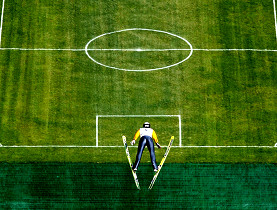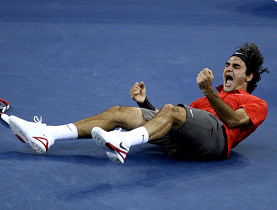Swiss athletes run up mixed year

For sports fans 2008 was an excellent year, with the Swiss-hosted European football championships and the Beijing Olympics the icing on the cake.
Admittedly Switzerland’s organisers had more success than its athletes, but as those who don’t make it to the podium say, it’s the taking part that counts…
Euro 2008, held in June in four Swiss and four Austrian cities, was the biggest event of any kind in Switzerland’s history.
Off the pitch, the tournament generated €1.3 billion (SFr2.02 billion) in revenue and ran without any major security or transport hitches, despite at least 80,000 Oranje (Dutch supporters) descending upon Bern and then Basel.
On the pitch, commentators hailed the quality of the football, culminating in Spain’s long-awaited win. Host fans, however, had less to cheer. The Swiss played like a team ranked 44th in the world and, as many Swiss admitted, were only playing at Euro 2008 because they were hosting it.
They failed to take what few chances they could create and lost their first two games against the Czech Republic and Turkey, thus becoming only the second Euro host to be eliminated before the last four. A meaningless 2-0 win over Portugal was little consolation for dashed – and unrealistic – expectations.
After the tournament Köbi Kuhn retired as Swiss coach and was replaced by Ottmar Hitzfeld, previously at Bayern Munich. The German’s main task is to lead Switzerland to the 2010 World Cup in South Africa.
This journey, which involves finishing top after playing home and away against Latvia, Greece, Moldova, Israel and Luxembourg, started badly on September 6 with a 2-2 draw in Tel Aviv after Switzerland led 2-0. It degenerated into farce four days later with a loss in Zurich to Luxembourg.
Two vital wins in October against Latvia and Greece put the Swiss back in the running, but their remaining six matches, which take place between March and October 2009, will no doubt have Swiss fans sweating and swearing in equal measure.
Swiss embarrassment continued in the Champions League, football’s most prestigious club tournament. Switzerland’s sole representatives, Basel, were on the wrong end of two 5-0 thrashings and their campaign ended on December 9 with just one point from six matches.
Faster, higher, Federer
On August 8 Roger Federer, the world tennis number one for another ten days, carried the Swiss flag ahead of 81 other athletes at the opening ceremony of the Beijing Olympic Games.
Switzerland finished 34th on the medal table with one gold, one silver and four bronze.
Cycling was the most lucrative event, with gold and bronze collected by Fabian Cancellara in the men’s individual time trial and men’s road race and a bronze by Karin Thürig in the women’s individual time trial. Nino Schurter brought in another bronze in the men’s mountain bike race.
Sergei Aschwanden won a bronze for the judo men’s middleweight event, and Federer and Stanislas Wawrinka redeemed early singles tennis losses by taking the gold in the men’s doubles event.
See the accompanying article for a review of Federer’s year, but credit should be paid to Wawrinka, who in June broke into the top ten rankings for the first time.
On December 6 Cancellara was named Swiss sportsman of the year by television viewers, pipping five-time winner Federer and alpine skier Didier Cuche.
Ariella Kaeslin, a 21-year-old gymnast, was named sportswoman of the year for her fifth place in Beijing. Although she didn’t win a medal, her result in the vault was the best ever by a Swiss woman gymnast at the Olympics.
Cold comfort
Turning to the snow, in March Switzerland’s men skiers crowned a successful World Cup season, with the highpoint being Didier Cuche clinching his second consecutive downhill title. The 34-year-old was third in the overall men’s World Cup rankings.
It was a different story for the women, with only 16-year-old Lara Gut, who finished third in her first downhill race, giving the Swiss something to feel good about.
While the photogenic Gut’s future looks rosy, in October Stéphane Lambiel, the two-time world figure skating champion, ended his competitive career at the age of 23, citing a lingering muscle injury. The first Swiss world champion in 48 years, Lambiel will now perform only in exhibition galas.
The news was better for Simon Ammann, who after several years of disappointment returned to the world ski jumping scene at the beginning of December with a World Cup win in Trondheim, Norway. After the first three events of the season, Ammann – who won two gold medals at the 2002 Salt Lake City Olympics – leads the field.
Looking ahead
2008 was a bumper year for sport, but fans needn’t worry about a comedown in 2009.
If the four tennis grand slams, starting with the Australian Open on January 19, turn out to be even half as exciting as last year, we’re in for a treat. Roger Federer will also be in action in the Davis Cup on March 6, when newly promoted Switzerland take on the United States.
In April the world’s 16 best ice hockey teams will come to Switzerland for the annual ice hockey championships.
No matter if sailing is impossible to follow on television, there’s always drama with the America’s Cup – currently held by Swiss syndicate Alinghi – even if it’s recently been in the courtroom.
Since winning the 32nd cup in 2007, the team of billionaire Ernesto Bertarelli has been locked in legal limbo with US team Oracle over the particulars of the next race, which should take place sometime after May 29 in Valencia. However, the legal disputes may well continue.
People who take their sport a little less seriously or who are looking for something slightly unusual can head in September to the national Hornussen championships, an exclusively Swiss pastime that has been described as “golf mixed with baseball played by farmers”.
swissinfo, Thomas Stephens
Switzerland’s 2009 games for the 2010 football World Cup:
March 28: Moldova – Switzerland
April 1: Switzerland – Moldova
September 5: Switzerland – Greece
September 9: Latvia – Switzerland
October 10: Luxembourg – Switzerland
October 14: Switzerland – Israel
Switzerland won six Olympic medals:
Gold: Roger Federer and Stanislas Wawrinka, Tennis, Men’s Doubles
Gold: Fabian Cancellara, Cycling, Men’s Individual Time Trial
Bronze: Fabian Cancellara, Cycling, Men’s Road Race
Bronze: Karin Thürig, Cycling, Women’s Individual Time Trial
Bronze: Sergei Aschwanden, Judo, Men’s Middleweight (81-90 kg)
Bronze: Nino Schurter, Men’s Mountain Bike Race
2 billion in revenue for Uefa, 45% more than in 2004.
SFr386 million ($325 million), the operational budget of the championship.
SFr82.5 million in funds released by the government.
1.05 million tickets.
80,000m2 of temporary buildings erected around the eight stadiums.
13,000 soldiers mobilised in Switzerland to assist the authorities.
35,000 accreditations (Uefa, press, personnel, security, etc).
8,000 volunteers signed up by Uefa and the Swiss host cities.
SFr6,700, the Uefa donation for each goal scored, given to the humanitarian aid project Goals for the Red Cross.
682 girls and boys who came from around Europe to act as official companions to the 22 players during the 31 matches.
554 collectible stickers needed to fill one of the special Swiss Euro 2008 albums.
368 players.
100km of cables installed to allow for the TV broadcast.
24 hours, the time a hooligan had to remain in custody after being arrested.
15 matches in Switzerland.
1 winner.

In compliance with the JTI standards
More: SWI swissinfo.ch certified by the Journalism Trust Initiative












You can find an overview of ongoing debates with our journalists here . Please join us!
If you want to start a conversation about a topic raised in this article or want to report factual errors, email us at english@swissinfo.ch.